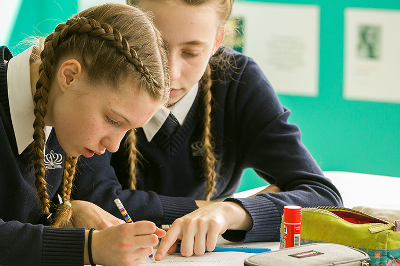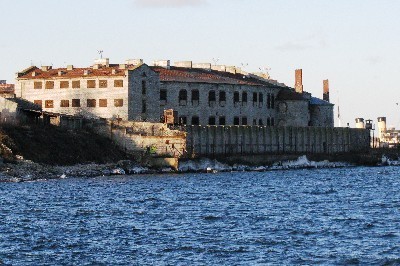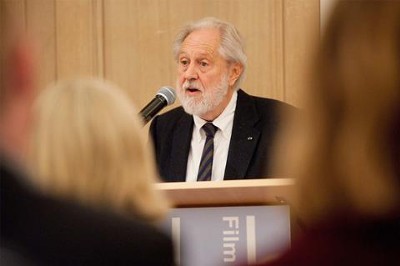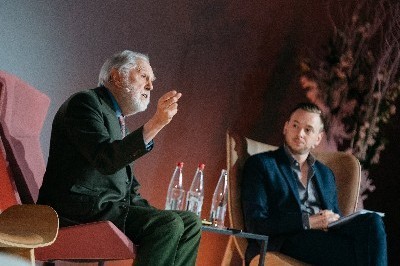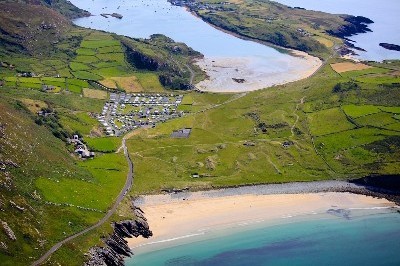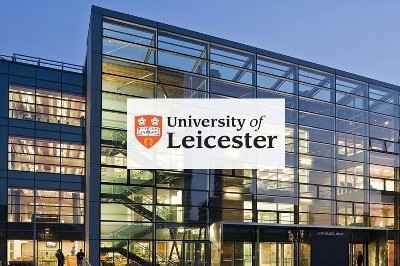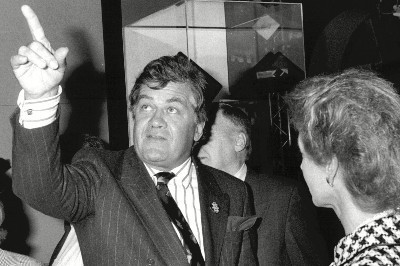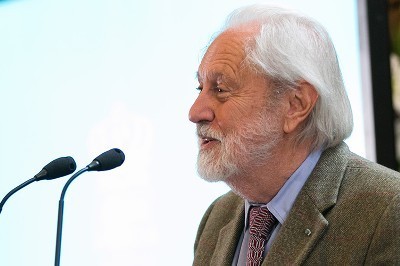Source: This article appeared in the Daily Mirror on 30/01/2018.
Lord David Puttnam looks at environmental challenges, political and economic interests which threaten the world of our children.
“It’s surprising, but people are interested in Climate Change” a volunteer said as I made my way through crowds at the entrance of Hall De Galle where Lord David Puttnam is delivering a lecture on Climate Change as part of the Fairway Galle Literary Festival 2018. The volunteer’s amazement is imaginable as the hall brims with excited film and literature lovers, young and old, eager to listen to what the veteran British film producer had to say.
His achievements are no mean feat. Lord Puttnam spent 30 years as an independent producer of award-winning films including The Mission, The Killing Fields, Midnight Express and Local Hero. His films have won ten Oscars, ten golden globes, 25 Baftas and the Palme D’Or at Cannes. Having retired in 1988 from film production he engaged with work in public policy as it relates to education, the environment and the creative and communications industries. He has also been the recipient of more than 50 honorary degrees.
“The first step in solving a problem is understanding that there is one. So recognising problems is a vastly important and necessary step in dealing with Sri Lanka’s challenges,” Puttnam began piquing the interests of his audience. “Secondly Climate Change is real! The result is previously unimaginable levels of migration.”
Puttnam does not mince his words as he speaks of the implications of migration on a country such as Sri Lanka, even though the results of climate change seem vague to many. “What is absolutely sure are the ramifications of climate change which would result in levels of migration the world has never seen or is prepared to think about.” Speaking of the migration crisis in the Mediterranean the celebrated British film maker says it helps put things in perspective. “What’s happening in the Mediterranean is with relatively small numbers of people. Rethink this as a dress rehearsal,” he tells his audience.
“One thing we do discover is that when people see their lives as having no hope, they are prepared to do anything. And anything includes picking up their very young children, getting into a dinghy boat, paying every penny you have in the world, to some corrupt transporter and taking your chances. Because whatever is going to happen is better than where you are. You must remember, this is what’s going on in the world.”
The scenes that followed Puttnam’s words were unsettling to say the least. On the screen the audience saw in film, panic stricken faces, families with several young children, on a treacherous journey to a safer place aboard a small boat. The heat, exhaustion, cries of frustration, moans for help, unintelligible muttering and finally scenes of rescue; a sombre audience related to.
“These are manageable numbers” Puttnam commented. “What’s going on in the Mediterranean is entirely unacceptable and unforgivable. As people are getting displaced, some welcome them off the boats. This is a particularly interesting issue for Sri Lanka. Because it is very likely Sri Lanka will see an ingress of such migrants and become ‘a destination for migration’. Unimaginable large numbers of people looking for somewhere to land. Sri Lanka has got one; the 1,340 km coast line,” he reminded his audience asking them to imagine a future where people would be scurrying to exploit this coastal belt. “It is an enormous issue and something important to discuss right now. It’s not as if we don’t know that this is going to happen” he added.
The first step in solving a problem is understanding that there is one. So recognising problems is a vastly important and necessary step in dealing with Sri Lanka’s challenges.
Climate change is real!
“For today’s young people this will be their supreme test. For my father’s generation it was World War II, for my generation it was the civil rights movement. The challenge for the next generation has got to be how to address the issue of climate change,” Puttnam opined.
“Impacts are scary and what you need to remember is that the world’s habitat is only 10 km deep. Everything that grows on this earth, every human being, every animal is living off an atmosphere which is in total 10 km deep. We have only got one earth. The problem is, we are on an annual basis using the resources of five planets. It is an absurd notion that we can continue to use the resources in the way that we do!” Earth’s thin atmosphere is all that stands between life on Earth and the dark void of space. Our planet’s atmosphere has no clearly defined upper boundary but gradually thins out into space. Speaking of this visible blue line depicted in satellite images, Puttnam said that our ability to see that line from outer space means understanding what it means. “It is reserved only for gods and angels to be lookers on,” Puttnam quoted. We are not and cannot be lookers on. We have very serious, personal and collective human responsibility.”
The Oscar-winning producer of several successful films of the 1970s and 80s, which include Chariots of Fire and Bugsy Malone, donned his producer hat following an 18-year career break in 2015. His film recounts the Arctic 30 event, the story of Greenpeace Activists who, in September 2013 scaled a Russian oil platform in an attempt to ‘Save the Arctic’.
Their protest was met with brutal force as Russian President Vladimir Putin’s commandos seized their ship. The activists were charged with piracy and faced fifteen years in the Russian prison system.
According to Puttnam he was not merely interested in the film’s dramatic appeal. “I wanted to make a film that gets younger people to understand that sacrifice will be a necessary part of their lives. If we can get a generation of youngsters from 15 to 19-year-old girls, to understand that people of their generation — brave girls just like them– risked their lives for them, who knows what may happen?,” Quoting Trotsky, Puttnam added “the truth is you may not have anything to talk about the future, but the future will be very interested in talking about you.”
“In the 2004 Tsunami, 20,000 people in this country died, another 20,000 were badly injured. But it’s going to stop. It’s the one thing climate scientists agree on, that this type of event would become more and more common. We’ve had three major storms this year. Incidence of major global events will only increase. Just to remind us how utterly devastating it was,” Puttnam said as he shared videos of harrowing accounts of the boxing day Tsunami.
Impacts are scary and what you need to remember is that the world’s habitat is only 10 km deep. Everything that grows on this earth, every human being, every animal is living off an atmosphere which is in total 10 km deep
As the audience fell silent, Puttnam reminded “the unforgiving power of nature is not only awesome, it’s unstoppable. We’ve been messing around nature for the best part of a 100 years, without having any real civic sense of what we were digging ourselves into.”
“Sri Lanka is facing a threat of sea level rising, Galle region is facing inundation in 2025” he noted, elaborating on how the Western, Southern and South-Western regions were facing the threat of inundation, according to data from Sri Lanka’s Disaster Management Centre. The activist highlighted how the disaster has already arrived on our doorstep. “Droughts, floods, landslides, all those effects of climate change are inevitable. This is what is happening right now”, Puttnam said as he pointed to the screen with a spectacular file image of a dry-as-a-bone Siyambalangamuwa reservoir.
Truth vs. Trust
“American economist Lawrence Henry Summers, the US Treasury Secretary of the time of the 2008 global financial crisis, once made a very interesting relation. He said he knew it in 2005. But he couldn’t quite identify what it was. In 2006, talking to politicians about the destabilising factors of the US economy.” Puttnam elaborated on how none of them wanted to talk about what was happening until it was too late. “And that is exactly what’s happening now. The fact is that there is no planet B.”
Interestingly he noted, the UN has not had any form of organised general meeting or a general assembly to discuss the impacts of climate change and migration. “It’s not that the Secretary General has tried, it’s just that the topic is regarded as ‘too political’.”
Hence, the real issue according to Puttnam is establishing the trust between the communicator and the public. He went on to show his audience the 2017 Edelman Trust Barometer revealing that the general population’s trust in all four key institutions — business, government, NGOs, and media — has declined broadly in unprecedented levels. “Official sources have become less trusted than rumour. We have reached a point where we are all prepared to trust the rumour over the fact,” he remarked.
Speaking on how media portrays facts and truth Puttnam noted the famous image of the Napalm Girl, caught in a moment of desperation in 1972, encapsulated the terror of the US war in Vietnam. “The point the photographer of this picture makes is that a single image allowed the world to say enough is enough. That image went everywhere and portrayed the futility of that war. What’s fascinating for me is that no one I meet in the United States can tell me what the Vietnam war was about,” Puttnam divulged to amused spectators.
The veteran film-maker then chose to engage his audience with a clip from Aaron Sorkin’s ‘The Newsroom’ a story set in the newsroom of fictional ACN cable news. The scene Puttnam chose was to drive home the point was where a fictional television anchor Sloan Sabbith grills a creator of an app which traces celebrities, and debates on the morale foundation of his creation. As the audience watched in captivation, at the end of the clip, Puttnam noted “If only it were true!” highlighting the need for unbiased and trustworthy communication in this day and age.
“Climate Change is the civil rights movement of this generation. It’s there, it’s coming and we address it as best we can. I’m not a religious person, fortunately, some people in authority are spreading the message which is really encouraging,” Puttnam concluded as the audience watched a clip of Pope Francis’s recent appeal for nuclear disarmament and climate change action.



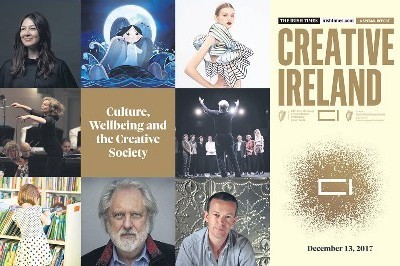
 In recent months, discussions about artificial intelligence and automated technology have become commonplace in parliaments, boardrooms and households around the world. People are worried about how digital change will affect their jobs, their industries and their nation’s economic output. The increased automation of many professions signals these as legitimate concerns, and leaders need to prepare their citizens accordingly for what lies ahead.
In recent months, discussions about artificial intelligence and automated technology have become commonplace in parliaments, boardrooms and households around the world. People are worried about how digital change will affect their jobs, their industries and their nation’s economic output. The increased automation of many professions signals these as legitimate concerns, and leaders need to prepare their citizens accordingly for what lies ahead.